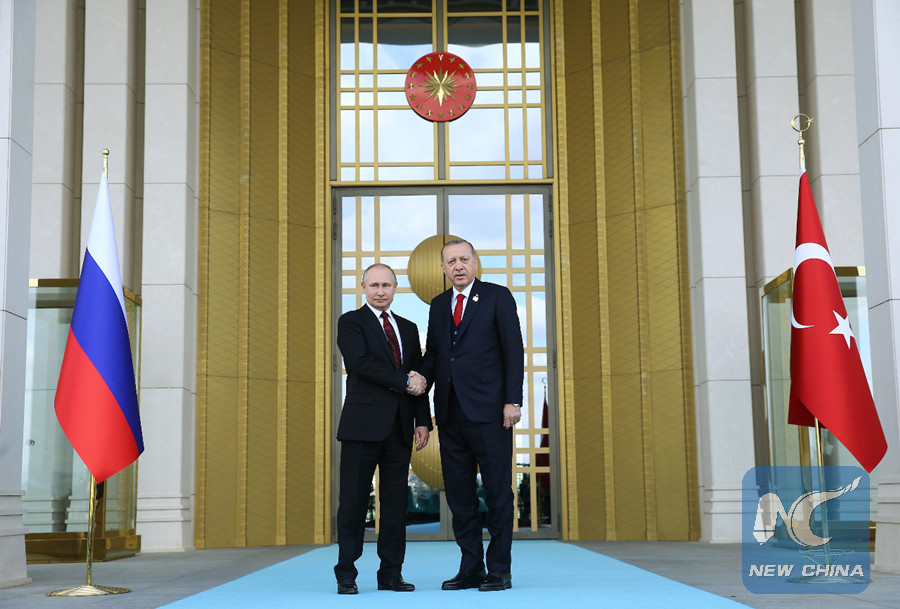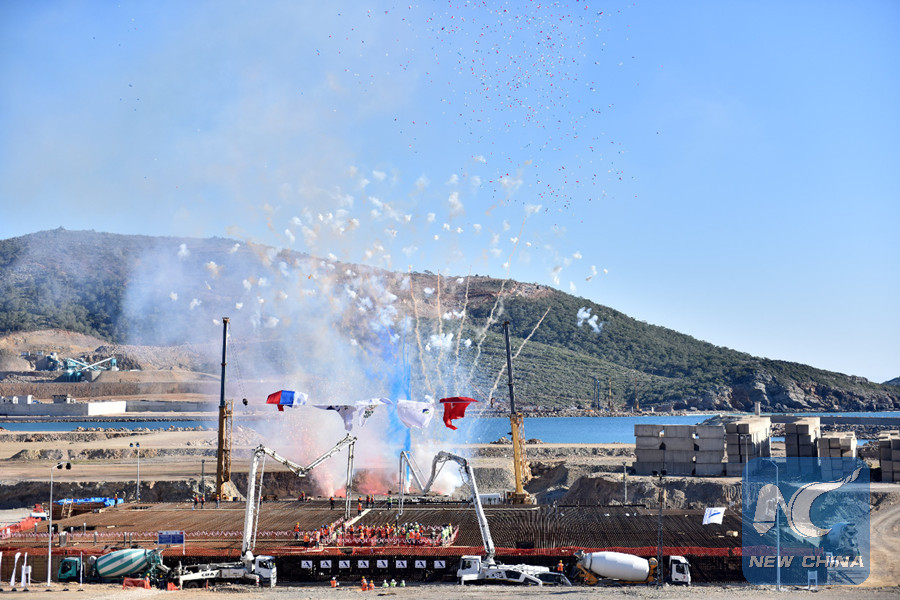
Turkish President Recep Tayyip Erdogan welcomes his Russian counterpart Vladimir Putin at the Presidential Palace in Ankara, Turkey, on April 3, 2018. (Xinhua/Turkish Presidential Palace)
By Burak Akinci
ANKARA, April 3 (Xinhua) -- A groundbreaking ceremony with attendance of Russian and Turkish presidents via a video teleconference was held Tuesday for Turkey's first nuclear power plant, Akkuyu Nuclear Plant, a strategic choice for Ankara facing setbacks but a powerful symbol of the deepening cooperation with Moscow.
"The successful implementation of the Akkuyu Nuclear Power Plant will be a symbol of the dynamic development of Turkish-Russian partnership," Russian President Vladimir Putin said during the video teleconference.
The plant is located at Akkuyu in the Mediterranean province of Mersin. It will ultimately have a 4,800-megawatt capacity of installed power and will cost some 20 billion U.S. dollars.
The first unit of the plant which will have four reactors, is due to be launched in 2023, while the other units will be commissioned one by one in the following years.
The plant is expected to generate an average of 35 billion kilowatt hours of electricity annually when it reaches its full potential in 2023, the centennial of modern Turkey and President Recep Tayyip Erdogan's "2023 vision" of major investment and infrastructure programs.

The groundbreaking ceremony of Turkey's first nuclear power plant, Akkuyu Nuclear Power Plant, was held Tuesday with the participation of Turkish and Russian presidents via a video teleconference from capital Ankara. (Xinhua photo)
A first ground-laying for the plant was planned for April 2015, but it did not take place because the major project signed in 2010 was halted when Turkey downed a Russian warplane near the Syrian border a couple of months earlier, plunging bilateral ties into a crisis mode.
Ankara and Moscow reconciled after a series of high level talks and the project restarted with a fresh impetus yet several delays and some funding issues pushed the finishing deadline from 2019 to 2023. A full capacity is due to be reached in 2026.
Russia has already invested 3 billion U.S. dollars in the Akkuyu project via the Russian state-owned contractor Rosatom and its finalization will consecrate a new chapter of the close strategic ties between NATO partners Turkey and Russia, said experts.
"The Russian foreign policy is based on two axes: arms and energy. Nuclear energy has its place as a strategic foreign policy tool," said Kerim Has, a Moscow State University lecturer to Xinhua, highlighting the importance of the Akkuyu projects in bilateral ties.
"Rosatom has contracts to build 34 nuclear power stations in 12 countries and provide their nuclear fuel and the contracts that this company is engaged to fulfill make up to 133 billion U.S. dollars," explained this expert in Russian affairs.
Turkey is a NATO member and has angered other NATO partners, such as the U.S., traditionally Turkey's biggest arms supplier, by its insistence to purchase S-400 missile systems under a loan deal reached last year with Russia.
The initial delivery of the Russian-made advanced missile system is planned for the first quarter of 2020. The air defense systems will be operated by the Turkish Armed Forces independently of Russia and could be deployed for the protection of the Akkuyu plant.
Has explained that the Akkuyu project, despite delays, is still a very good deal for the Russian part because Turkey is expected under past agreements to buy one kilowatt of electricity for 12,35 cents, which is well above the world market level.
The sharing of the financial burden of the Akkuyu plant is one of the most important points of the agreement concluded in 2010. Half of the project would be financed by the Turks, which should yield important revenues for Russia in the long term, and increase its geopolitical presence in this part of the world, remarked Kerim Has.
Turkey or Turkish private sector companies are to provide 49 percent of the financing. Russia will control supervision and management. For several years now, dozens of Turkish technicians and personnel are being trained in Moscow.
Russia is seeking long-term guarantees for the projects and also investors which makes the funding problematic as Turkish company's showed reluctance to participate. Two major Turkish companies Kalyon and Kolin backed out of a proposed deal to purchase 49 percent of the facility, sparking for some time question marks on the future of the project.
Rosatom meanwhile announced last week that despite the withdrawal of investors from the project, it is still committed to go ahead and is expecting to receive soon the construction license to start building the plant.
The company also said that it was in talks with Turkish state-owned power producer EUAS after the collapse of the deal with the two other large Turkish industrial holding companies but what is certain now that the sell of a 49 percent stake in the plant has been postponed from 2018 to 2019.
"The probability to close the deal on the stake sale of the plant is low this year but it is likely to take place in the next year," the Chief Executive Officer of Rosatom, Alexei Likhachev, told reporters during a press conference in Moscow last week.
Turkish companies have been put off by the sheer size of the financing required and the local media reported that the firms also fear that the electricity price could be lowered which would amount to a loss of revenue.
Turkey's energy imports amount to some 55 billion U.S. dollars annually and the energy demands of the 80 millions strong country is one of the fastest-growing of Europe, pushing the country to diversify its sources and cut dependency on mostly Russian natural gas.
Russian President Putin confirmed in November the launch of the plant's first reactor, saying that construction would begin in the near future.
And clearly as a good will gesture, Rosatom has received on Monday, just one days ahead of Putin's visit, a full construction license from Turkey's atomic energy authority, Xinhua learned from informed sources who argued out that the 2023 might still be at stake and that a new delay is possible.
"There are still many uncertainties in the future of the Akkuyu project. It is intertwined with politics and Russia wants Turkey to do its part in it," argued Kerim Has, insisting that funding issues will eventuality seal its faith.

